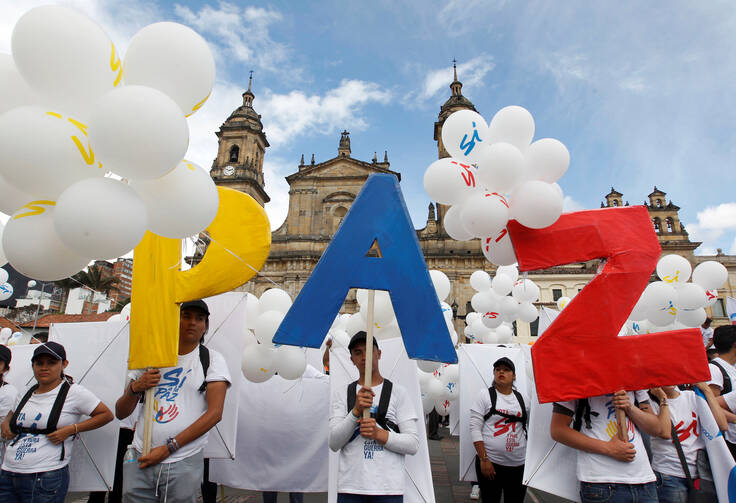Colombia, blessed by a visit by Pope Francis this week, has lived for more than 50 years with an absurd war between the government and the Armed Revolutionary Forces of Colombia (FARC) that has destroyed its natural beauty and tested the kindness of its people in the most cruel ways. However, before this bankruptcy of human dignity, there remains a space for hope in which the distinct face of God is emerging. It is to contemplating this face that many Jesuits have given their lives, discerning where God is creating new life, where resilience is growing and where new configurations of reconciliation and forgiveness are being born.
The structure that sustains the spirituality of our mission is in the Spiritual Exercises of St. Ignatius and its teaching that everyday life is the source of our relationship with God. The Ignatian Examen of Conscience encourages us to act just as the merciful Father would act in the midst of this wounded world, in which the many manifestations of structural and personal sin harm the lives of thousands of human beings. If our honesty with ourselves is effective, we have nothing less than a mirror with which to reveal to all the abundant sinfulness and fragility of ourselves and our society. Yet Ignatian spirituality urges us into not a myopic view of our own guilt but a radical transformation in which we discover how God is already fashioning mercy in Colombia.
Ignatian spirituality urges us into not a myopic view of our own guilt but a radical transformation in which we discover how God is already fashioning mercy in Colombia.
The veteran peacemaker Francisco De Roux, S.J., is one of the Jesuits who has been able to perceive this dream so desired by God. Commenting on the visit of the pope to the peace negotiations in Cuba, he writes: “There, Pope Francis had prayed that the strength of the blood of the Victims would let us out of the darkness. The day before, the Cubans invited us to a piano recital and the interpretation of ‘Night of Peace’ sounded like a prelude to the agreement that announced that peace was possible.”
The startling discovery of a way forward in the midst of the darkness begins to answer the question of how God dreams of peace in Colombia. It is through the acceptance of the wounds we bear that we are capable of feeling and acting like him with healing and sympathy. The pain of Colombians who have suffered massacres, kidnappings, the economic neglect of the state and the absurd consequences of corruption draws us forward in the way that the Good Samaritan is impelled to heal the wounded man at the side of the road. Of course, it is the insight of St. Ignatius that when we strive toward what is greater, the bad spirit, too, is at work. That is why in Colombia we have also witnessed the hidden forces of those who oppose peace and want to drown it in their own selfish interests and greed.
Pedro Arrupe, S.J., the superior general of the Society of Jesus from 1965 through 1983, once spoke about the need for a change of vision, saying: “Be good. Show goodness in your face, which must be relaxed, serene and smiling; Goodness in your eyes, a look that first surprises and then attracts. Goodness, divine goodness was always the gaze of Jesus.” To achieve the change of vision we desire and to describe the startling discoveries we are making in Colombia, perhaps we should look to the German expression for “mercy.” Barmherzigkeit is composed of two elements: barm- for maternal being (which we can interpret as tenderness, affection toward others) and -herzigkeit (sympathy). This understanding of mercy connects us with the vital experience of being children because we have all in one way or another received maternal love. Now, through anthropology and philosophy, we understand that every human being is capable of that same love, for we are created to forgive. So why keep hatred and grudges, wounds that never heal? Why prolong the distance between us? Let us take courage and make our way toward forgiveness.
In short, we assume our commitment to God’s dream of peace as a constant choice in our daily decisions, in an acceptance of our wounds and in the contemplation of the changing face of our people—which reveals the merciful love of the Father in spite of all that has gone wrong. For peace is born from our interiority. It is a peace that brings us closer, a peace that reconciles, because there is no authentic peace that does not lead to the reconciliation of relations. All this passion kindles our hearts as once God ignited the heart of the pilgrim Ignatius of Loyola. We are not abandoned in a cold and harsh reality; God himself is coming to meet us in every human situation. And we are ready to work with God amid the wounds we have inflicted to bring home his dream of peace.










